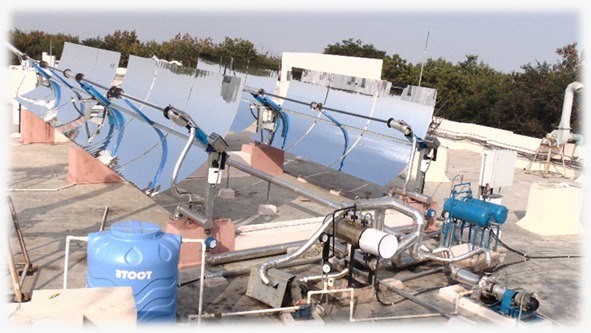A new Concentrated Solar Thermal ( CST) based test rig facility in Hyderabad has been established which can help India’s growing solar sector to test the capabilities and performance of solar thermal components such as solar receiver tubes, concentrating mirrors and heat transfer fluids.
The facility has been set up by the International Advanced Research Centre for Powder Metallurgy and New Materials (ARCI), an autonomous institute of the Department of Science & Technology (DST). Solar thermal components such as solar receiver tubes, heat transfer fluids, concentrating mirrors, and AR coated glass tubes of the CST system in field conditions will be validated .
Boost to Aatmanirbhar Bharat
It will validate the indigenous components by comparing the performance (heat gain and heat loss properties) with varied operational parameters (e.g., flow rates of Heat Transfer Fluids (HTFs) operating temperature, pressures, etc.) and different DNI (Direct Normal Irradiance) conditions and circumstances.
Need
Most of the solar thermal companies import solar thermal components, particularly from China and Europe, so, the development of solar thermal technologies for low and medium-temperature applications requires a great deal of attention towards indigenous solar thermal components manufacturing facilities with cost-effective engineering designs
ARCI is working on the development of cost-effective solar receiver tubes,, coated glass covers, anti-reflective (AR), nanostructured material-based thermic fluids and durable reflective mirrors to improve the performance of solar thermal systems in India.
Apart from this development, testing and validation of the components in real-field conditions are necessary for the deployment of solar thermal technology. In order to cater to this need, ARCI has constructed a concentrated solar thermal-based single-axis parabolic trough test rig facility which is sponsored by the Technology Research Centre (TRC) project of the DST.
The parabolic-trough test rig facility has features for simultaneous testing of standard and indigenous solar receiver tubes. It has a thermic fluid-based closed-loop system that can operate ranging from 50 – 350°C. It can conduct heat gain studies in real-field situations or with the actual measurement of solar irradiance condition and has an electrical heater support for measuring and evaluating the actual heat loss of solar receivers at different operating temperatures.
ARCI’s test rig facility will provide the performance of indigenously developed solar thermal components in actual field operating conditions, thus attracting interest from the industries and various other stakeholders. HPCL, R&D,(Hindustan Petroleum Corporation Limited) at Bangalore has sanctioned a project to ARCI for validating their indigenously developed heat transfer fluids with the comparison of a world-leading commercial product.
About National Mission on use of Biomass in coal based thermal power plants
Earlier, to address and solve the issue of air pollution which arises due to farm stubble burning and to reduce the carbon footprints of thermal power generation, the Ministry of Power decided to set up a National Mission on use of Biomass in coal based thermal power plants. This would further aid the energy transition in the country and will set new targets to move towards cleaner energy sources.
The future of Renewable Energy in India
Renewable energy in India has emerged as the most viable and environment-friendly options to cater to the energy requirements of one and all. As per the Paris Accord on Climate Change, India made a pledge that by 2030, 40% of installed power generation capacity will be majorly from non-fossil fuel sources and also by 2030 the country will reduce the emission intensity of GDP by 33-35 % from 2005 level.




























 WhatsApp us
WhatsApp us